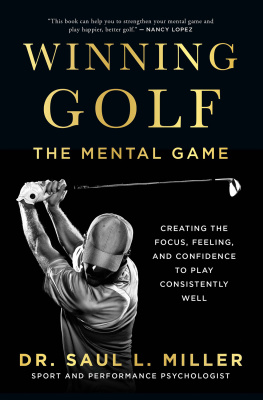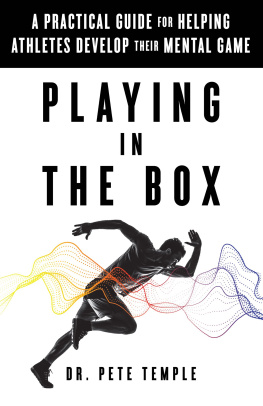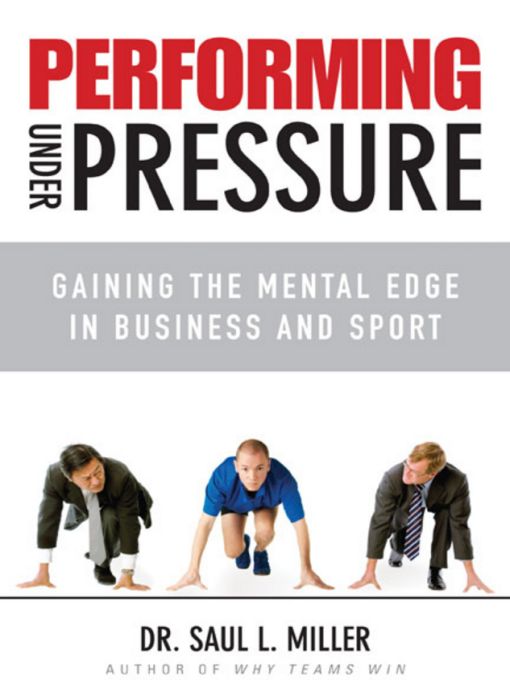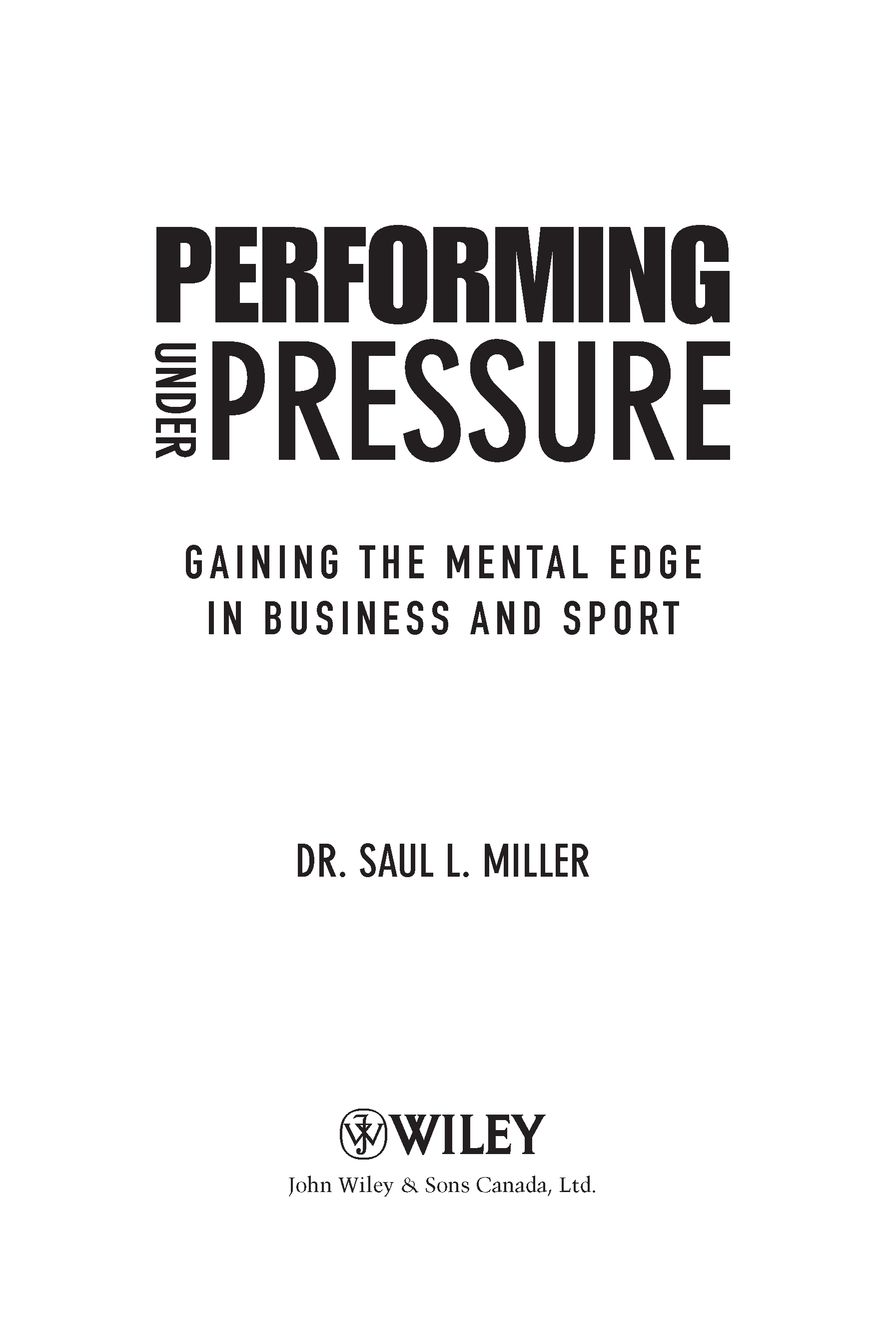Table of Contents
MORE PRAISE FOR PERFORMING UNDER PRESSURE
A criminal trial lawyer has to perform under pressure everyday. A poor performance could mean a client being wrongfully convicted and sentenced to a very long time in custody. Dr. Millers book is loaded with useful, practical advice and interesting stories of his work with some of the worlds elite performers. I highly recommend this book to anyone who performs under pressure.
- Brian Coleman, criminal lawyer
In Performing Under Pressure Dr. Miller provides some very practical advice on how to excel in a highly charged professional environment. I highly recommend this book to colleagues and patients.
- Dr. Bruce Ward DDS, President,
British Columbia Dental Association
Dr. Miller truly knows the intricacies and criteria required to enable peak performance. Performing Under Pressure is loaded with precise and practical advice on how to excel in the moment. I highly recommend it.
- Rodger Schmidt, competitor and three-time Olympic and World
Championship Coach for USA, Italy, Austria and Germany
To Garfield and Laara and to all who strive and press to excel, win, and be loved.
ACKNOWLEDGEMENTS
I wish to acknowledge Karen Milner, Jennifer Smith, and the very capable team at John Wiley & Sons for their enthusiasm and support for this book. And many thanks to Garfield L. Miller and Laara K. Maxwell, my home team, for raising the bar with insightful feedback and editorial expertise.
I also wish to thank all of those who through our consultation, counseling, and personal interaction, or through their writings and ideas, have contributed to making the book a success: AnneMarie, Alan, Art, Barry, Bobby, Brian, Bruce, Cam, Cathy, Carole, Charmaine, Chris, Chuck, Cindy, Clark, Cliff, Craig, Curt, Dan, Davey, David, Dawn, Deborah, Dick, Don, Donna, Doug, Fred, Gale, Gary, George, Glen, Greg, Harreson, Jack, Jenny, Jim, Joe, John, Julie, Kathleen, Kelly, Ken, Kevin, Larry, Leroy, Luke, Mark, Matt, Michael, Mitchell, Morris, Nancy, Paige, Paul, Pete, Peter, Randy, Ray, Rick, Ron, Roy, Ryan, Sam, Sean, Shaun, Sharon, Sid, Stanley, Tanya, Thelma, Tiger, Tom, Vince, Will, and Yvon. Thank you all.
INTRODUCTION
WE ARE ALL PERFORMERS
For over a quarter of a century, I have been fortunate to work with elite performerspeople with the talent, motivation, and desire to be the best they can be. In principle, excelling is really quite simple. It is about having a clear idea of what you want to do, acting on that idea, staying focused, and persevering until you make it happen. However, sometimes, something comes between the desire and the doing. That something is often pressure.
Its the sixth game of the World Series and the team at bat is trailing in the Series three games to two. Its the tenth inning and they are losing the game 5 to 3. There are two out and two runners on base. One more out and they will lose the World Series. The batter stepping up to the plate is a seasoned veteran, yet like many competitors, in his desire to excel he sometimes tries too hard, tenses up, and interferes with his performance. As he stands at the plate facing the pitcher at that critical moment in the game and the Series, he desperately wants to get a hit, to express his ability. There are 60,000 frantic fans in the stadium, 60 million more watching on television. The atmosphere is electric. The pressure is enormous.
With just one second left in the game and his team losing 29 to 27, the kicker stands poised to kick a 33-yard field goal. The field goal will mean victory. Missing the kick will mean losing the game and probably his job. It is a seemingly routine kick, the kind he made at practice over 100 times during the week. However, the previous Sunday, he missed two short field goals and was blamed in the press for his teams loss. Now he stands in front of 55,000 people, with millions more watching on national television. The game and his job hang in the balance. The pressure is enormous.
The scene is the cycling velodrome at the summer Olympics. Its the one-kilometer race, the fastest cycling speed race of them all. Three laps around the track, full speed against the clock. One chance, no repeats. The fastest time wins. The rider is only nineteen years old, the youngest in the race. Still, he has been training for years for this moment. Its what he dreams about. The whole race will take less than 65 seconds. The question is will he be able to bring it all togetherhis desire, talent, training, and technique? As his turn approaches, he can feel the tension building and his heart pounding. The pressure is enormous.
Its 8:48 a.m. as the young executive steps into the corporate boardroom. After several years with a large multinational company, he is about to give a presentation on the status of an account he has been managing. Its his first opportunity to impress the senior executives and CEO, and he is extremely motivated to make a favorable impression. He believes his future with the company is dependant on how he comes across in this meeting. He knows its vital the presentation gets off to a good start. As the moment approaches he can feel anxiety and tension building. The question racing through his mind is, Can I pull it together and really show them who I am and what I can do?
The batter, the kicker, the Olympian, and the executive are my clients, along with many other outstanding performers. The list includes major league All-Stars, NFL quarterbacks, NHL goalies, tour golfers, and Olympians in a dozen different sports, as well as stock brokers, surgeons, writers, actors, musicians, managers, dentists, lawyers, and people in marketing, sales, movie-making, rehabilitation, and law enforcement. They all want to succeed, to win, and to realize their goals and dreams. In so doing they repeatedly face the challenge of having to perform and excel in intense, high-pressure situations. At one time or another all of them have experienced how tension, pressure, anxiety, and stress can alter their perception, undermine their confidence, affect their judgment, and limit their performance.
My job is to facilitate success, to help my clients excel. To do that, I work with both mind and body. I coach my clients to exercise more psycho-physical control, and to release tension, fear, worry, and limiting thoughts. I coach them to use the situation, and to tune into and focus on thoughts, images, and feelings that give them power.
In the case of the batter, the kicker, the Olympian, and the executive, I spent hours working with them, helping them to excel in just the kind of intense situations described. Our goal was that, even under extreme pressure, they could regulate their emotion, shift focus, and experience more ease, power, and impact. And they did.
The World Series batter got the game-saving hit. The next night he did it again. His home run in the seventh and final game was the decisive blow and he was voted the Series most valuable player. The kicker made the field goal. His team won the game. In the two weeks that followed, he set a league record for the longest field goal. The Olympian rode a great race, a personal best. He recorded the fastest time of the day until the last rider surpassed it. He won an Olympic silver medal. The young executive gave a compelling and impressive presentation. He spoke with clarity and poise, and the feedback he received from the senior executives was strongly positive. Shortly thereafter, he was approached to lead a larger, more high-profile account.










